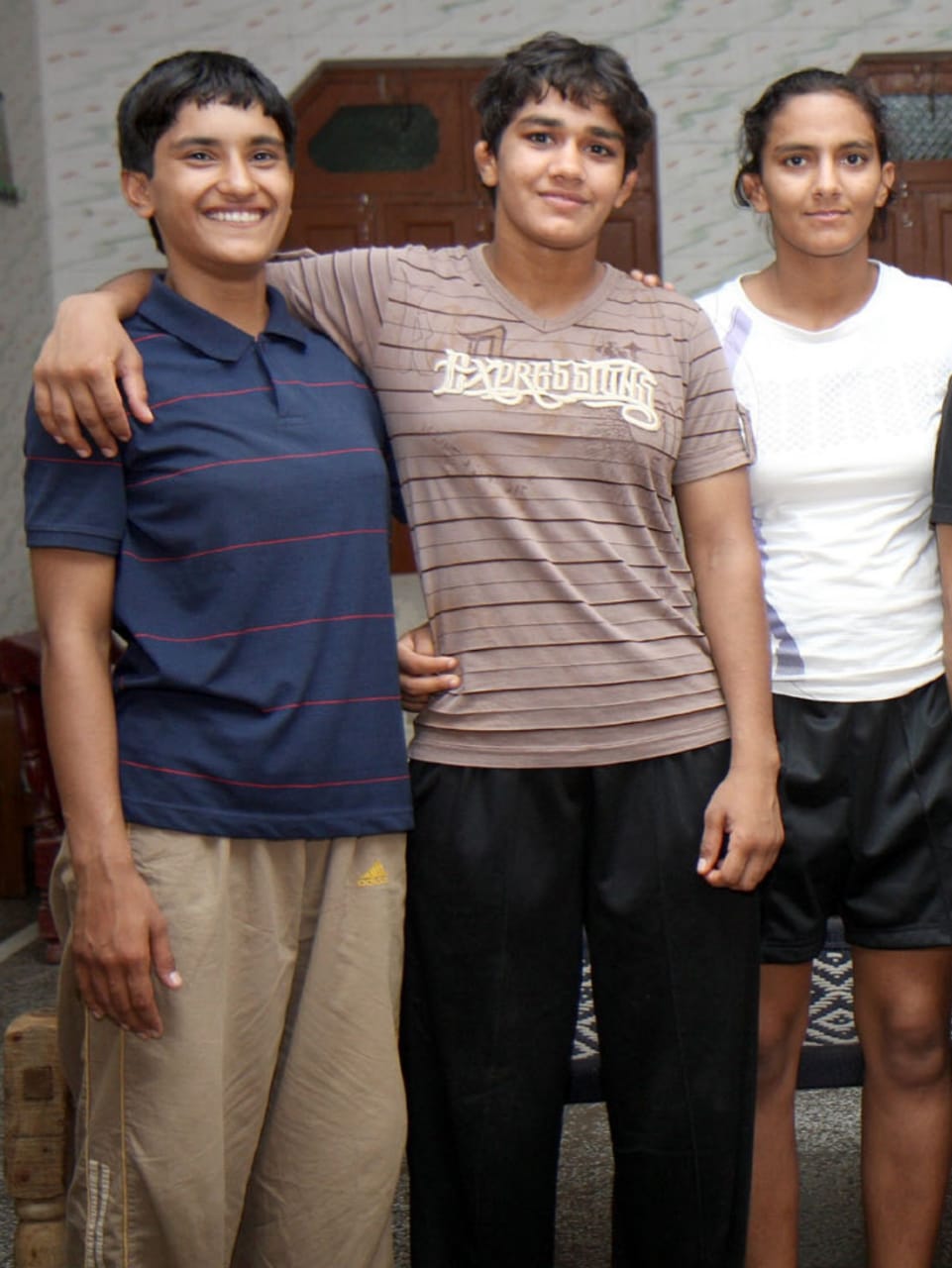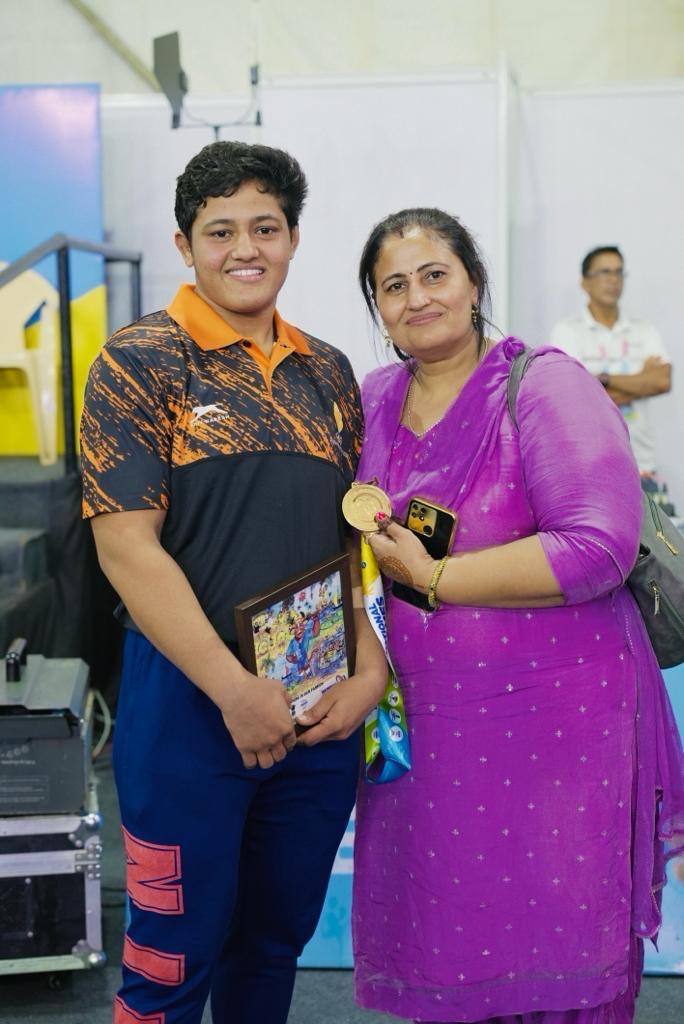When Mahavir Phogat saw weightlifter Karnam Malleswari’s podium finish at the 2000 Sydney Olympics, it inspired him to introduce the girls in his family to wrestling.
Not just that, his aim was to prepare them for the Olympic podium.
However, this was not an easy task in a state like Haryana with the lowest sex ratio, where women’s struggles begin in the womb itself.
Although women’s wrestling had been introduced in India in the mid-90s, it was largely confined to Delhi and had yet to make inroads into Haryana. Mahavir’s initiative to train his daughters Geeta, Babita, Ritu, Sangeeta, along with his nieces, Vinesh and Priyanka, faced resistance from villagers, including his own family.
His life inspired the Aamir Khan-starrer Bollywood movie, Dangal.
Allowing the girls to enter the mud pit, traditionally seen as a male domain, was met with significant opposition in his village Balali in Charkhi Dadri district (then in Bhiwani).
Similarly, almost a year-and-a-half later, an initiative to allow girls to train alongside boys at Chotu Ram Stadium Wrestling Centre in Rohtak faced societal hurdles. Former wrestlers, and even some coaches, expressed reservations, questioning “how goats could stay among the lions”, fearing that the presence of girls would distract boys, leading to indiscipline.
Fast forward to 2024. What was once met with sarcasm—people comparing girls to goats and boys to lions, emphasising the perceived disparity in strength and prowess in the wrestling arena—has now become a point of pride.
Haryana’s women wrestlers have emerged as the flag bearers of Indian wrestling on the global stage. At the 2024 Paris Olympics, India is represented by six wrestlers, five of whom are women from Haryana’s rural landscape, where they once faced stiff opposition to entering the male-dominated sport.
Meet the team
The Indian wrestling contingent in Paris comprises Vinesh Phogat (50kg) from Charkhi Dadri, Antim Panghal (53kg) from Hisar, Anshu Malik (57kg) from Jind, Nisha Dahiya (68kg) from Panipat, Reetika Hooda (76kg) from Rohtak, along with the lone male wrestler, Aman Sehrawat (57kg) from Jhajjar.
“Olympics is every sportsperson’s dream, and I am feeling happy to be a part of the world’s biggest sporting event,” said Reetika Hooda, who hails from Kharkara Village in Rohtak. “Moreover, Indian women wrestlers leading the Indian charge in Paris is a great motivation for its future here.”
Women’s wrestling was introduced in the Olympics at the 2004 Athens Games, and Indian women wrestlers made their debut at the 2012 London Olympics. Since then, the Phogat family has been represented in every Olympic Games, including in Paris 2024.
It started with Mahavir’s eldest daughter Geeta, who became the country’s first woman wrestler to qualify for the Olympics at the 2012 London Games. In the next edition, it was Babita and Vinesh, and followed just by Vinesh in the 2020 Tokyo Olympics.
In 2024 Paris, Vinesh will be competing in her third Olympics, becoming the first Indian woman wrestler to feature in three quadrennial games.
“When I introduced the family girls into wrestling, my aim was an Olympic medal. The girls have won all the medals, and now only the Olympic medal is missing. I hope Vinesh will win it this time in Paris,” says Mahavir Phogat, their mentor.

The 2010 Commonwealth Games, hosted in New Delhi, saw women’s wrestling making its debut in the Commonwealth Games, and the performance of the Indian women wrestlers—three gold, two silver, and a bronze—changed society’s mindset towards women wrestlers.
People no longer recognize them as goats but have started seeing them as lionesses in the wrestling arena.
“It’s been a long journey, from villagers being up in arms against the move of making the girls slug it out with boys in the mud pit, to the entire village standing in their honour for the women wrestlers winning medals at the 2010 Commonwealth Games. Since then, Indian women wrestlers have excelled on the world stage,” says Mahavir.
“Now, five of them making it to the Paris Olympics speaks a lot about women wrestling in India,” he adds.
In the 2016 Rio Olympics, an edition after the Indian women wrestlers made their Olympic debut, a trainee of Rohtak’s Chotu Ram Wrestling Centre, Sakshi Malik, became the first Indian woman wrestler to win an Olympic medal. She won bronze in Rio.
Since then, the women trainees of the centre have had a presence in every Olympics.
In 2020 Tokyo, Seema Bisla, who trained for a couple of years at the centre, was part of the Indian wrestling contingent. Now, in 2024 Paris, the centre is represented through its trainee Reetika Hooda, who is the first Indian woman wrestler in the heavyweight category to qualify for the Olympics.
“Immediately after women’s wrestling was introduced in Haryana, the state’s girls began making their presence felt at the national level, and gradually the Indian women’s wrestling squad became largely an all-Haryana affair,” explains Mandeep, a coach at the centre under whom Sakshi Malik and Reetika train.
“Now, in the Paris Olympics, the women wrestlers from Haryana have become synonymous with Indian wrestling. It feels nice that you have contributed your bit to this change,” he says.
“Over the years, women’s wrestling has seen a vertical growth. A decade ago, there were around 20 girls at the Rohtak centre, and now the number has crossed 100. And I am only talking about one training centre. Now there are many more such centres for women across the state,” the coach says.
“Indian women wrestlers are doing very well, and we are expecting a couple of medals from them in Paris,” he adds.
Family support
Initially, when society was not accepting the women from the khap land of Haryana to be part of the wrestling world, it was the unconditional support of family, especially the parents, that kept women’s wrestling going.
“Many of our relatives are from a sports background, so they had no issues with putting the family girls in wrestling, but it wasn’t so forthcoming from the ones who weren’t. Whenever they used to meet us, their main concern was, what would be her future if Reetika didn’t excel in wrestling? But her father stood by her decision,” says her mother, Neelam Devi.
“Ever since Reetika earned the Paris Olympics quota place, the same relatives have been wishing her success. Hope no other girl has to face any more sarcasm, especially those from rural areas,” adds Neelam Devi.

She and her husband, Jagbir Singh, shifted their base from their native village to Rohtak, so that they could provide better education to their kids and wrestling came along the way.
The journey of Indian women wrestlers has not been easy so far. Apart from facing challenges from society, they had to even fight against the system, as evidenced by the 2023 wrestlers’ protest at Jantar Mantar, led by Sakshi Malik and Vinesh Phogat among others.
This protest shocked the nation, revealing how authorities deal with women wrestlers despite their laurels for the country.
“Girls need to stop feeling pity for themselves or considering themselves weak. You have to have the strength of belief in yourself. The first step has to be taken by a girl herself; everything else follows,” Vinesh had told The Hindu.
The time has changed. Now Indian wrestling is recognised by women wrestlers from Haryana.
This article has been written by Saurabh Duggal. Edited by Padmashree Pande.
No comments:
Post a Comment